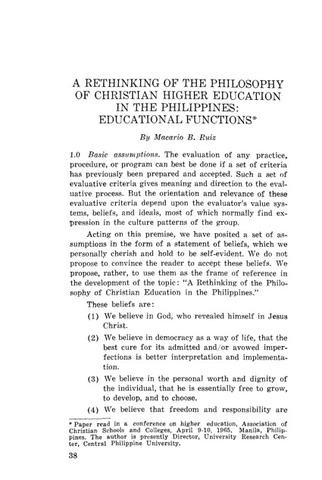A rethinking of the philosophy of Christian higher education in the Philippines: Educational functions
| dc.contributor.author | Ruiz, Macario B. | |
| dc.date.accessioned | 2023-08-15T08:55:34Z | |
| dc.date.available | 2023-08-15T08:55:34Z | |
| dc.date.issued | 1967-01 | |
| dc.identifier.uri | https://hdl.handle.net/20.500.12852/2762 | |
| dc.description | Journal article | en_US |
| dc.description.abstract | Paper read in a conference on higher education, Association of Christian Schools and Colleges, April 9-10, 1965, Manila, Philippines. The author was Director, University Research Center, Central Philippine University. The evaluation of any practice, procedure, or program can best be done if a set of criteria has previously been prepared and accepted. Such a set of evaluative criteria gives meaning and direction to the evaluative process. But the orientation and relevance of these evaluative criteria depend upon the evaluator’s value systems, beliefs, and ideals, most of which normally find expression in the culture patterns of the group. Acting on this premise, we have posted a set of assumptions in the form of a statement of beliefs, which we personally cherish and hold to be self-evident. We do not propose to convince the reader to accept these beliefs. We propose, rather, to use them as the frame of reference in the development of the topic. These beliefs are: (1) We believe in God, who revealed himself in Jesus Christ. (2) We believe in democracy as a way of life, that the best cure for its admitted and/or avowed imperfections is better interpretation and implementation. (3) We believe in the personal worth and dignity of the individual, that he is essentially free to grow, to develop, and to choose. (4) We believe that freedom and responsibility are inseparable, that freedom without responsibility is empty, and that without freedom one only reacts, not responds. (5) We believe in the sanctity of the home, which is the basic unit of society. (6) We believe in world peace and brotherhood among all peoples of all nations, based on the concept of the Fatherhood of God. (7) We believe that Christian morality must regulate the personal, family, social, economic, political, and international life of men if civilization has to endure. | en_US |
| dc.language.iso | en | en_US |
| dc.publisher | Central Philippine University | en_US |
| dc.subject.lcsh | Christian education--Philosophy | en_US |
| dc.subject.lcsh | Philippines | en_US |
| dc.subject.lcsh | Christian education | en_US |
| dc.title | A rethinking of the philosophy of Christian higher education in the Philippines: Educational functions | en_US |
| dc.type | Article | en_US |
| dcterms.accessRights | Publicly accessible | en_US |
| dc.citation.firstpage | 38 | en_US |
| dc.citation.lastpage | 49 | en_US |
| dc.citation.journaltitle | Southeast Asia Quarterly | en_US |
| dc.citation.volume | 1 | en_US |
| dc.citation.issue | 3 | en_US |


